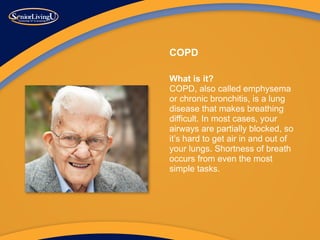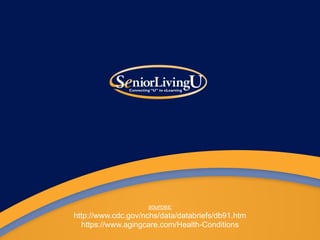Understanding the Chronic Illnesses Affecting Senior Living Residents
- 1. Understanding the CHRONIC ILLNESSES Affecting Senior Living Residents
- 2. In a recent study the Center of Disease Control outlines the 10 most common chronic conditions affecting senior residents of residential care facilities.
- 3. What is it? Blood pressure is the force of blood pushing against artery walls as it is carried throughout your body. Blood pressure is measured by counting heart beats and the rest between beats. High blood pressure means your heart and arteries are working too hard, which can lead to stroke, heart attack or kidney problems. HIGH BLOOD PRESSURE
- 4. Warning Signs • Individuals who are overweight • A family history of high blood pressure • Men over 45/Women over 55 • Long-lasting stress • Smoking • Excess alcohol drinking • A diet in high sodium and low in potassium HIGH BLOOD PRESSURE
- 5. What is it? Dementing disorders affect parts of the brain, causing problems with memory, thinking, language, emotions or movement. Alzheimer’s Disease is the most common form of dementia in people over 65 years old, affecting 5.1 million seniors. ALZHEIMER’S DISEASE/ OTHER DEMENTIAS
- 6. Warning Signs • Forgetfulness/Memory loss • Lack of concentration or confusion • Language or speaking skills • Poor judgement • Personality changes and mood swings ALZHEIMER’S DISEASE/ OTHER DEMENTIAS
- 7. What is it? Heart disease is a catch-all description that includes many cardiovascular conditions, including heart attack, stroke, cardiac arrest and high blood pressure. Heart attacks affect 1.1 million people each year. They occur when blood flow to a section of heart muscles becomes blocked, which can cause heart muscles to become damaged or begin to die. HEART DISEASE
- 8. Warning Signs • Chest pain or discomfort that lasts more than a few minutes or that goes away and returns • Upper body discomfort in arms, back, neck, jaw or stomach • Shortness of breath, with or before chest pain • Nausea • Cold sweats HEART DISEASE
- 9. What is it? Depression is a common mental illness that effects not only your emotional state but your physical well being as well. It affects more than 6.5 million Americans 65 years old and older. DEPRESSION
- 10. DEPRESSION Warning Signs • Persistent sad, anxious, empty feeling • Irritability, agitation or restlessness • Fatigue and decreased energy • Feeling worthless or helpless • Thoughts of death or suicide
- 11. What is it? Arthritis attacks and inflames the body’s joints, causing swelling, redness and pain. Arthritis can be caused by the break down of cartilage, autoimmune disease or the formation of acid in the joint spaces. ARTHRITIS
- 12. Warning Signs • Joint swelling • Joint stiffness • Warmth or redness at joints • Lasting joint pain • Problems moving joints normally ARTHRITIS
- 13. What is it? Osteoporosis is a condition that is marked by low bone mass and deterioration of bone tissue. Frail bones lead to increased fractures of the hips, vertebra and wrists and a longer healing period. It’s most common (68%) in women. OSTEOPOROSIS
- 14. OSTEOPOROSIS Warning Signs • Seniors with thin or small frame builds are at a higher risk • Drugs including prednisone, corticosteroids, antidepressants and thyroid hormones can increase your risk • People with Crohn’s disease, lupus or rheumatoid arthritis are at a higher risk • A history of anorexia is a warning sign, because it lowers hormone levels and interferes with bone building
- 15. What is it? When you suffer from diabetes your body cannot produce or use insulin properly. As a result, sugars, starches and other foods cannot properly convert into energy. The most common type is Type 2 Diabetes or Adult-Onset Diabetes. DIABETES
- 16. Warning Signs • Fatigue • Frequent urination • Increased thirst and hunger • Blurred vision DIABETES
- 17. What is it? COPD, also called emphysema or chronic bronchitis, is a lung disease that makes breathing difficult. In most cases, your airways are partially blocked, so it’s hard to get air in and out of your lungs. Shortness of breath occurs from even the most simple tasks. COPD
- 18. Warning Signs • Constant coughing • Shortness of breath • Excess production of sputum • Wheezing • Inability to take a deep breath COPD
- 19. What is it? Cancer occurs when cells in your body become abnormal and start producing more abnormal cells. They form together in a mass (tumor) which can hurt surrounding tissue and organs. They can also break away and spread to other areas of the body. CANCER
- 20. Warning Signs • Lumps or growths on any part of the body • A sore throat that does not heal • A persistent cough or sore/ hoarse throat • Discomfort when swallowing/ eating • Unusual bleeding • Feeling very weak or tired CANCER
- 21. What is it? A stroke develops when the blood supply to your brain is interrupted or a blood vessel in your brain bursts. The lack of oxygen and nutrients from blood or sudden bleeding into the brain can cause brain cells to die. STROKE
- 22. Warning Signs • Sudden numbness/weakness in one side of the body • Sudden confusion or trouble speaking/understanding speech • Sudden trouble with vision • Sudden dizziness, loss of balance or trouble walking • Sudden severe headache STROKE























